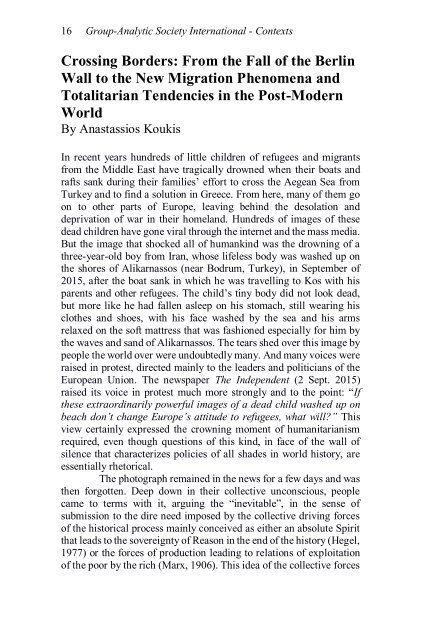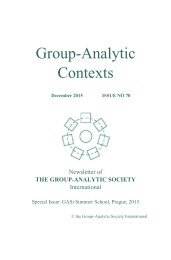Group-Analytic Contexts, Issue 76, June 2017
Special Issue: Preparing for the Berlin Symposium
Special Issue: Preparing for the Berlin Symposium
You also want an ePaper? Increase the reach of your titles
YUMPU automatically turns print PDFs into web optimized ePapers that Google loves.
16 <strong>Group</strong>-<strong>Analytic</strong> Society International - <strong>Contexts</strong><br />
Crossing Borders: From the Fall of the Berlin<br />
Wall to the New Migration Phenomena and<br />
Totalitarian Tendencies in the Post-Modern<br />
World<br />
By Anastassios Koukis<br />
In recent years hundreds of little children of refugees and migrants<br />
from the Middle East have tragically drowned when their boats and<br />
rafts sank during their families’ effort to cross the Aegean Sea from<br />
Turkey and to find a solution in Greece. From here, many of them go<br />
on to other parts of Europe, leaving behind the desolation and<br />
deprivation of war in their homeland. Hundreds of images of these<br />
dead children have gone viral through the internet and the mass media.<br />
But the image that shocked all of humankind was the drowning of a<br />
three-year-old boy from Iran, whose lifeless body was washed up on<br />
the shores of Alikarnassos (near Bodrum, Turkey), in September of<br />
2015, after the boat sank in which he was travelling to Kos with his<br />
parents and other refugees. The child’s tiny body did not look dead,<br />
but more like he had fallen asleep on his stomach, still wearing his<br />
clothes and shoes, with his face washed by the sea and his arms<br />
relaxed on the soft mattress that was fashioned especially for him by<br />
the waves and sand of Alikarnassos. The tears shed over this image by<br />
people the world over were undoubtedly many. And many voices were<br />
raised in protest, directed mainly to the leaders and politicians of the<br />
European Union. The newspaper The Independent (2 Sept. 2015)<br />
raised its voice in protest much more strongly and to the point: “If<br />
these extraordinarily powerful images of a dead child washed up on<br />
beach don’t change Europe’s attitude to refugees, what will?” This<br />
view certainly expressed the crowning moment of humanitarianism<br />
required, even though questions of this kind, in face of the wall of<br />
silence that characterizes policies of all shades in world history, are<br />
essentially rhetorical.<br />
The photograph remained in the news for a few days and was<br />
then forgotten. Deep down in their collective unconscious, people<br />
came to terms with it, arguing the “inevitable”, in the sense of<br />
submission to the dire need imposed by the collective driving forces<br />
of the historical process mainly conceived as either an absolute Spirit<br />
that leads to the sovereignty of Reason in the end of the history (Hegel,<br />
1977) or the forces of production leading to relations of exploitation<br />
of the poor by the rich (Marx, 1906). This idea of the collective forces













